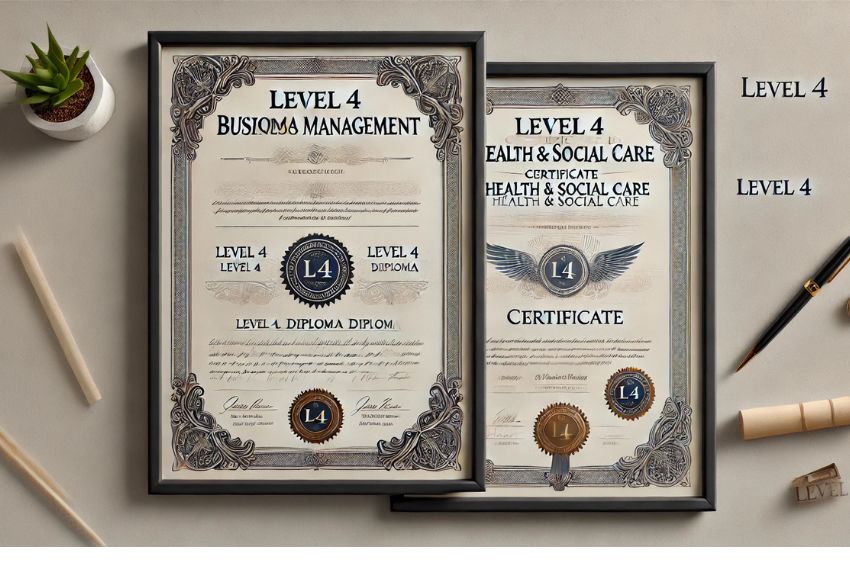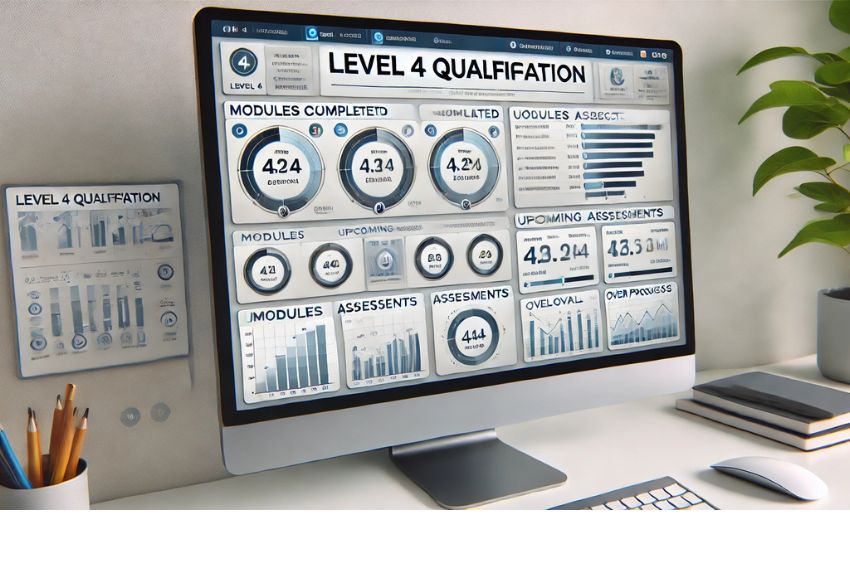The UK education system offers a wide variety of qualifications, catering to different learning styles, career aspirations, and academic levels. From GCSEs to university degrees, each level plays a role in building knowledge and skills for personal and professional growth. Among these, Level 4 qualification represent a significant step beyond A-levels, providing more advanced learning without requiring a full degree.
This guide is designed for students, parents, and professionals who want to know everything about Level 4 qualifications – what they are, how they work, and what opportunities they unlock. Whether you’re planning your next educational step, exploring career changes, or supporting someone else’s journey, this article will provide all the information you need
What Is A Level 4 Qualification?
Level 4 qualifications correspond to the first year of a bachelor’s degree and are regarded as advanced education. Level 4 qualifications sit just above A-levels (Level 3) on the UK’s Qualifications Framework and focus on specialist knowledge and practical skills. These qualifications are equivalent to the first year of a bachelor’s degree. It makes them them a great alternative for those who prefer hands-on learning or wish to fast-track into employment.

What Are The Main Level 4 Qualifications In The UK?
- Higher National Certificates (HNCs)
- Certificates of Higher Education (CertHE)
- Level 4 NVQs and Diplomas
- Professional Certificates (e.g., in Accountancy or Marketing)
- Higher Apprenticeships
Higher National Certificates (HNCs)
focus on practical skills tailored to specific industries like business, engineering, or healthcare. Typically completed in one year full-time or two years part-time, HNCs prepare students for technical roles or management positions, and they can also provide a pathway to further study through a Higher National Diploma (HND) or the second year of a degree program.
Certificates of Higher Education (CertHE)
Similarly, Certificates of Higher Education (CertHE) offer academic knowledge equivalent to the first year of university. These qualifications, available in subjects such as education, business, or humanities, usually take one year to complete. They are an excellent option for students wanting to explore higher education without committing to a full degree, and they also provide a solid foundation for further study or entry-level roles.
Level 4 NVQs and Diplomas
For those focused on developing hands-on expertise, Level 4 NVQs and Diplomas are ideal. These qualifications are common in fields like health and social care, construction, and hospitality, where practical, job-related skills are essential. They allow professionals to progress within their industries at their own pace, with opportunities to advance to higher vocational qualifications like Level 5 NVQs.
Professional Certificates
In addition to these options, professional certificates provide specialized training in specific fields. Organizations such as the Chartered Institute of Marketing (CIM) or the Association of Accounting Technicians (AAT) offer courses that equip learners with industry-relevant skills, enhancing their career prospects and credibility. These certificates can take a few months to a year to complete and often serve as stepping stones to advanced qualifications within the profession.
Higher apprenticeships
They combine academic study with work experience, allowing learners to earn a salary while gaining a Level 4 qualification. Offered in areas such as business, IT, engineering, and healthcare, these apprenticeships are an attractive option for those who prefer to enter the workforce early while continuing their education. Apprentices can further their learning through higher-level apprenticeships or degree-level qualifications as they progress in their careers.
These various pathways give learners the flexibility to tailor their education to fit their personal circumstances and career aspirations, whether they aim to advance within their current field or explore new opportunities through further study.
For Who Are Level 4 Qualifications For?
Level 4 qualifications are ideal for:
- A-level or Level 3 graduates who are looking to gain industry-specific skills.
- Professionals who are seeking career advancement or a career change through new qualifications.
- Apprentices who want to combine learning with work experience.
- Individuals who prefer practical learning over full academic courses.

How Do Level 4 Qualifications Compare to Other Qualifications?
The UK education system is structured into different qualification levels, each building on the one before. Level 1 qualifications, such as GCSEs (grades 1-3) and foundation certificates, focus on basic skills and knowledge.
Level 2 qualifications, like GCSEs (grades 4-9), NVQ Level 2, and intermediate BTECs provide more advanced foundational knowledge and prepare learners for further education or entry-level employment.
Moving up, Level 3 qualifications include A-levels and advanced BTECs, offering pre-university education that opens pathways to higher learning.
Level 4 qualifications, including HNCs and NVQs, mark the transition to higher education, offering knowledge equivalent to the first year of a bachelor’s degree.
At Level 4 (RQF), typical Level 4 qualification equivalent options include a Higher National Certificate (HNC), Certificate of Higher Education (CertHE), Level 4 Diploma/NVQ, or a Level 4 Higher Apprenticeship broadly matching the first year of degree study. As students progress, Level 5 (HNDs, foundation degrees) aligns with the second year of university, leading to Level 6 qualifications, which represent a complete bachelor’s degree. For those continuing even further, Level 7 qualifications, like master’s degrees and postgraduate diplomas, provide advanced expertise at the postgraduate level.
Level 4 equivalents are:
Qualification Level Table
| Qualification Level | Example | Equivalent |
| Level 1 | GCSE (grades 1-3), Foundation Certificates | Basic Skills |
| Level 2 | GCSE (grades 4-9), NVQ Level 2, BTECs | Intermediate Level |
| Level 3 | A-levels, Advanced BTECs | Pre-university qualifications |
| Level 4 | HNC, NVQ Level 4 | First year of a bachelor’s degree |
| Level 5 | HND, Foundation Degree | Second year of a bachelor’s degree |
| Level 6 | Bachelor’s Degree | Undergraduate degree |
| Level 7 | Master’s Degree, Postgraduate Diplomas | Postgraduate level qualifications |
Level 4 Equivalent Qualifications
Level 4 is the first step of higher education, sitting just above Level 3 (A levels, T Levels, BTEC Nationals). It’s broadly equivalent to the first year of a bachelor’s degree. Common Level 4 qualification equivalents include the Higher National Certificate (HNC), Certificate of Higher Education (CertHE), Level 4 Diploma or NVQ, and Level 4 Higher Apprenticeship. On frameworks, RQF Level 4 (England, Wales, Northern Ireland) matches roughly with SCQF Level 7 in Scotland. Entry usually comes after completing a Level 3 qualification.
What Are Benefits of Level 4 Qualification in The UK?
Level 4 qualifications in the UK offer practical, career-focused learning beyond A-levels, equipping students with industry-relevant skills. Here are some benefits of Level 4 Qualification:
- Flexible Learning Paths
- Many Level 4 courses can be completed part-time or through distance learning, making them accessible for those balancing work or other commitments.
- Industry-Relevant Skills
- Level 4 qualifications are designed with input from employers, focusing on practical, career-oriented skills to meet industry needs.
- Fast-Track to Employment
- Students can enter the workforce sooner than if they pursued a full bachelor’s degree. This can lead to job opportunities in fields like IT, healthcare, and business.
- Progression to Higher Levels
- A Level 4 qualification can count towards a higher qualification, such as a Higher National Diploma (HND) or a full degree.
What Are The Most Popular Level 4 Courses and Subjects?
Level 4 courses cover a broad range of subjects, with many focused on high-demand industries. If you’re interested what subjects are mostly demanded in level 4 courses we have listed the most popular choices bellow. These subjects attract learners due to their relevance, offering practical skills and specialized knowledge that align with career opportunities and meet employer demands in growing sectors.
- Business and Management
- HNC in Business Management
- Certificate in Leadership and Management
- Engineering and IT
- HNC in Electrical Engineering
- Level 4 Diploma in IT Networking
- Healthcare and Social Care
- NVQ Level 4 in Health and Social Care
- Higher Apprenticeship in Healthcare
- Creative Arts and Media
- Diploma in Graphic Design
- HNC in Performing Arts
How to Apply for Level 4 Qualifications In The Uk?
There are several ways to apply for Level 4 Qualifications. here is the list how you can do that:
- Through Colleges and Universities: Many institutions offer HNCs, CertHEs, and other Level 4 qualifications.
- Via Apprenticeship Providers: Apprenticeships combine on-the-job training with classroom learning, often leading to Level 4 certifications.
- Professional Bodies: Organisations like the Chartered Institute of Marketing offer industry-specific Level 4 courses.
- Online Platforms: Many Level 4 courses are available online, providing greater flexibility for learners.
What Is Cost and Funding Options For Level 4 Qualification?
The cost of Level 4 qualifications in the UK varies depending on the subject, provider, and study mode. Higher National Certificates (HNCs) and CertHE courses typically range between £1,500 to £4,500 per year. Professional qualifications and diplomas may cost between £1,000 to £3,000, while higher apprenticeships are often funded by employers, offering learners the opportunity to earn a wage while studying. Students can also explore government-backed loans for tuition and maintenance, or apply for bursaries and grants in specific sectors like healthcare and teaching. Some courses, especially those linked to apprenticeships, provide cost-effective routes into skilled employment.

What Do Credits at Level 4 Mean?
It is very important to understand the credit system, because it is a key part of education in the UK, helping to measure the amount of learning achieved in qualifications like Level 4 courses. Credits provide a standard way of quantifying the effort required to complete a qualification and ensure consistency across institutions. Understanding how these credits work is essential for students planning their educational pathways.
How the Credit System Works
Credits reflect both the time and learning outcomes involved in a course. In general, one credit equates to 10 hours of study, including class time, independent study, assignments, and exams. The total number of credits required for a qualification shows how demanding it is and how much time students need to invest.
- Level 4 qualifications, such as HNCs and Certificates of Higher Education, usually require 120 credits to complete.
- These credits are distributed across different modules or units within the course, with each module typically worth 10, 15, or 30 credits, depending on its size and complexity.
Why Are Credits Important?
Credits offer flexibility by allowing students to transfer their achievements between courses and institutions. This is particularly helpful for those who may wish to switch universities or transition from an HNC to the second year of a degree programme. It also ensures that students’ efforts are recognised, even if they don’t complete the full qualification.
Accumulation and Transfer of Credits (CAT System)
The Credit Accumulation and Transfer (CAT) system allows learners to accumulate credits from different institutions and apply them toward a higher qualification. For example, students with 120 Level 4 credits may use them to progress to a Level 5 HND or the second year of a bachelor’s degree.
European Credit Transfer and Accumulation System (ECTS)
Many UK qualifications, including Level 4, are aligned with the ECTS system used in Europe, where two UK credits are equivalent to one ECTS credit. This alignment makes it easier for students to pursue further education abroad, as their qualifications are recognised across borders.
How Credits Affect Progression?
The credits earned at Level 4 not only signify the knowledge and skills acquired but also serve as a stepping stone for future qualifications. For instance, students who complete an HNC with 120 credits may choose to progress to a Level 5 HND or directly enter the second year of a relevant bachelor’s degree. This system provides a clear path for academic and career advancement.
In summary, credits at Level 4 represent the effort and learning outcomes achieved by students, offering flexibility for progression and ensuring consistent recognition of qualifications both nationally and internationally.
What Career Prospect Can I Have With Level 4 Qualifications?
Level 4 qualifications prepare students for higher-level roles within industries, such as:
- Business: Roles like junior manager or team leader.
- IT: Positions in networking or software development.
- Healthcare: Opportunities as healthcare assistants or support workers.
These qualifications also serve as a stepping stone to further education or career progression, with many students continuing to Level 5 or higher qualifications.
Can I Progress to Higher Levels After Level 4?
Yes, Level 4 qualifications serve as a stepping stone to higher education and career progression. Completing a Level 4 course not only equips students with advanced skills but also provides a pathway to further qualifications:
- Higher National Diplomas (HNDs) or Level 5 NVQs.
- Bachelor’s Degrees (students may enter directly into the second year of a degree course).
- Professional Qualifications required for career advancement.
This flexibility ensures that learners can continue their education or enhance their careers based on their goals. Whether students choose to pursue further qualifications, transition into a bachelor’s degree, or gain additional professional certifications, the skills and knowledge acquired at Level 4 create a solid foundation for long-term success.
Conclusion
Level 4 qualifications therefore offer a practical and flexible route to gaining advanced skills and knowledge. In addition, they cater to students and professionals who want to enhance their careers without committing to a full degree. With options such as business, healthcare, IT, and more, Level 4 courses empower learners to align their education with career goals and open doors to exciting opportunities.
Moreover, if you’re looking for personalized support in your journey, online tutors can help you excel in your studies and stay on track. For instance, platforms like Edumentors connect students with experienced A-Level tutors, offering tailored guidance and expertise for Level 4 qualifications. Whether you’re aiming for career advancement or further education, Level 4 qualifications are a smart and strategic choice.
FAQs:
What is a level 4 qualification?
A Level 4 qualification is the first step of higher education in the UK. It sits above Level 3 (A levels, T Levels, BTEC Nationals) and is similar to the first year of a university degree.
What is Level 4 qualification equivalent to?
Level 4 qualifications include the Higher National Certificate (HNC), Certificate of Higher Education (CertHE), Level 4 Diploma or NVQ, and a Level 4 Higher Apprenticeship. They’re broadly equivalent to completing the first year at university.
What qualification levels mean?
Qualification levels show how advanced a course is on the Regulated Qualifications Framework (RQF) in England, Wales, and Northern Ireland (or SCQF in Scotland). For example:
Level 7–8 = Master’s and doctorate
Level 2 = GCSEs (grades 9–4)
Level 3 = A levels, BTEC Nationals, T Levels
Level 4–5 = First years of higher education (HNC, HND, CertHE, foundation degrees)
Level 6 = Bachelor’s degree
What is level 4 maths equivalent?
In the UK education system, Level 4 in Maths is equivalent to achieving a Grade 4 at GCSE.
That means:
- A Level 4 corresponds to a ‘standard pass’ under the 9–1 GCSE grading scale.
- It’s roughly equivalent to the old Grade C under the previous A*–G system.
- Most colleges, apprenticeships, and employers accept a Level 4 as the minimum pass for Maths.
If a student scores below Level 4, they haven’t reached the national minimum standard and may need to resit GCSE Maths (or take Functional Skills Maths Level 2 as an alternative qualification).








